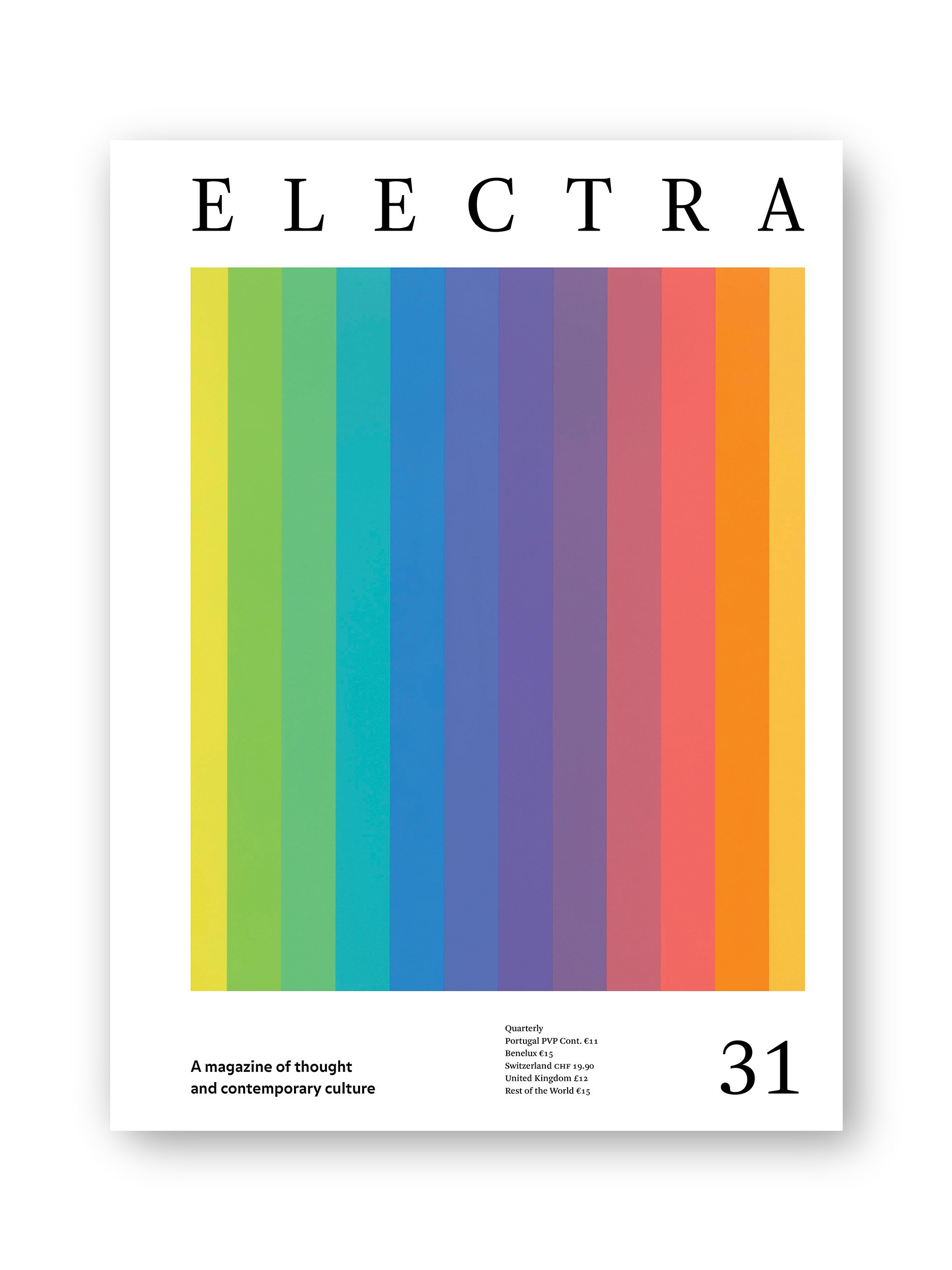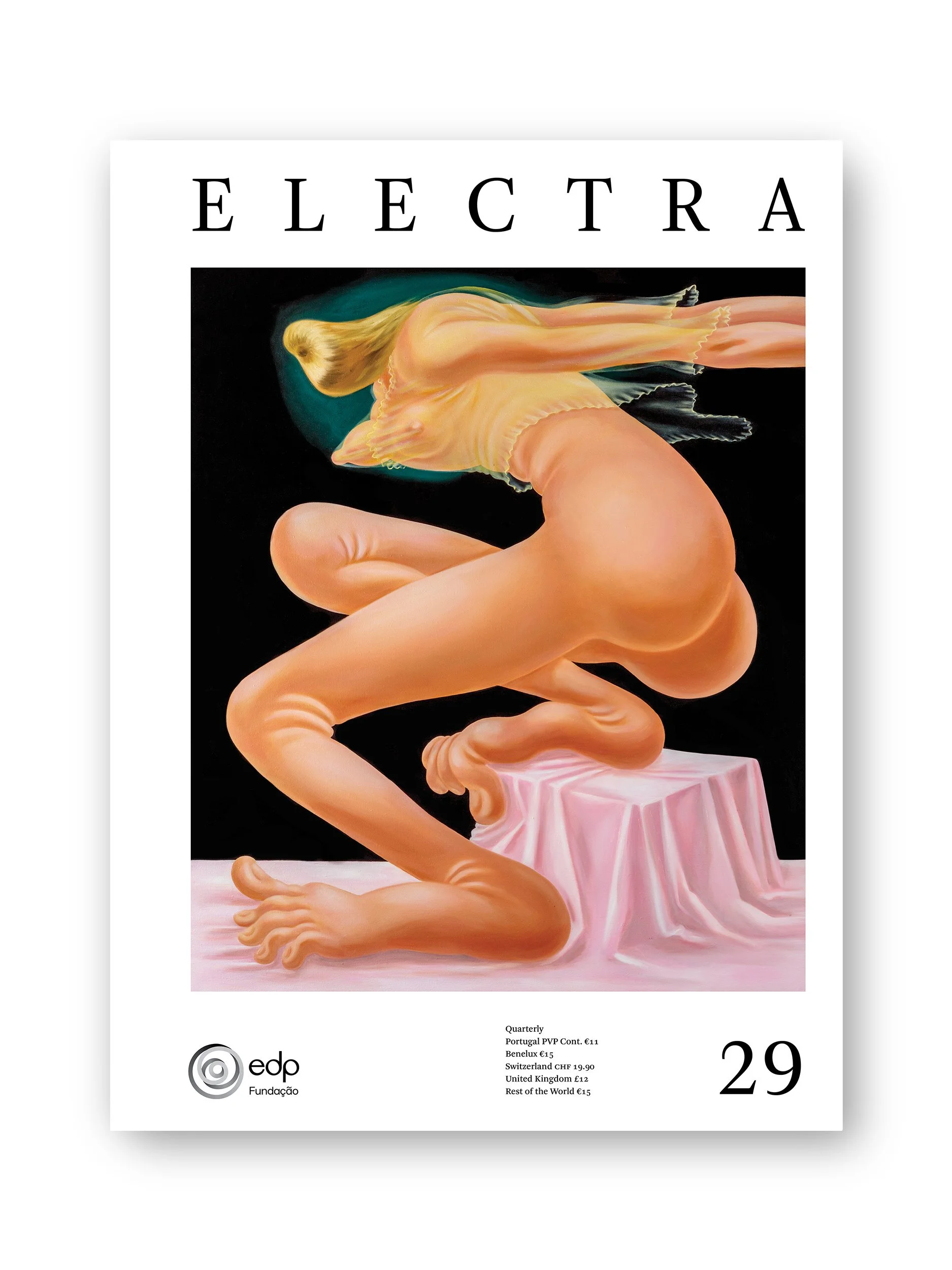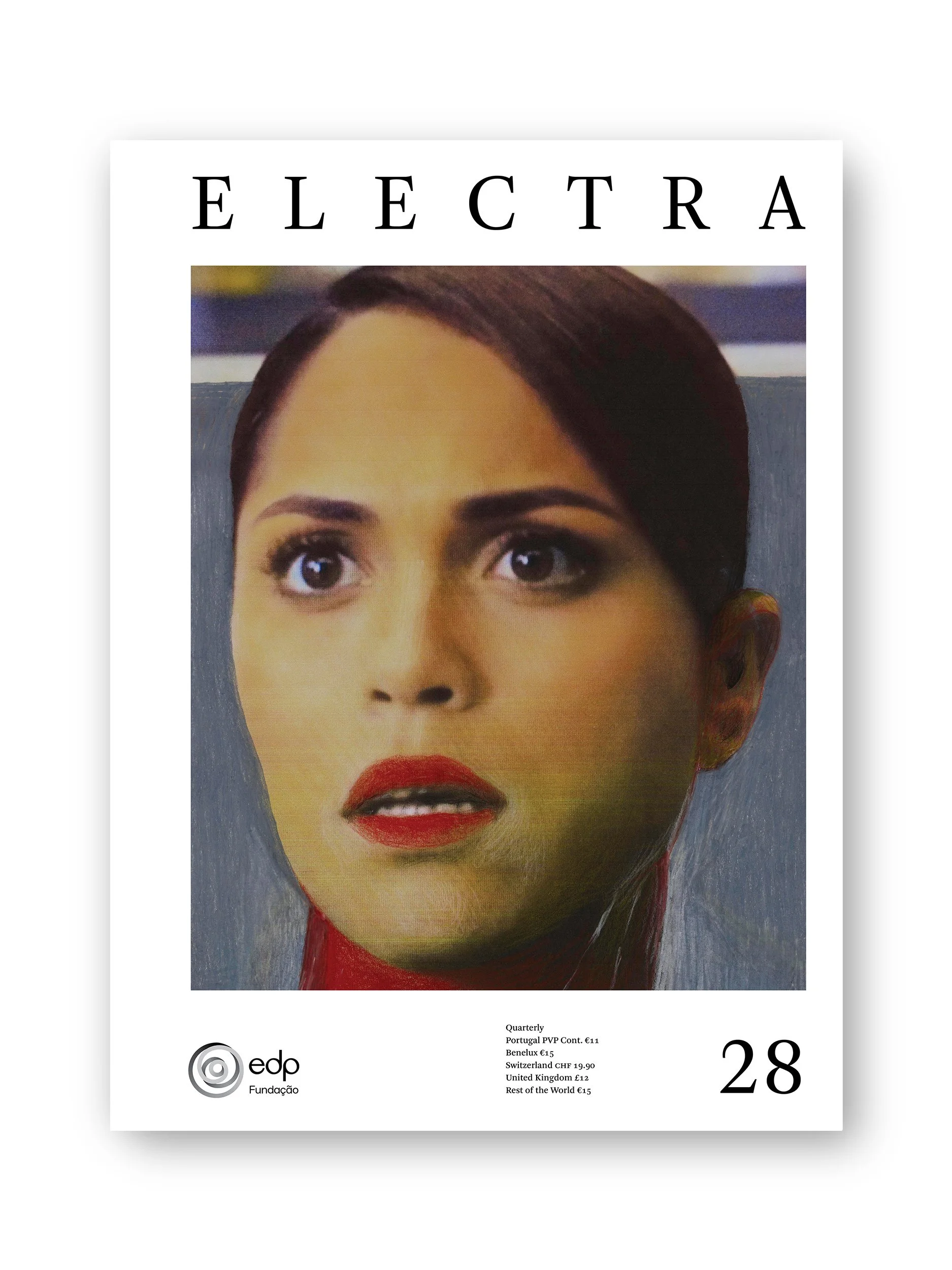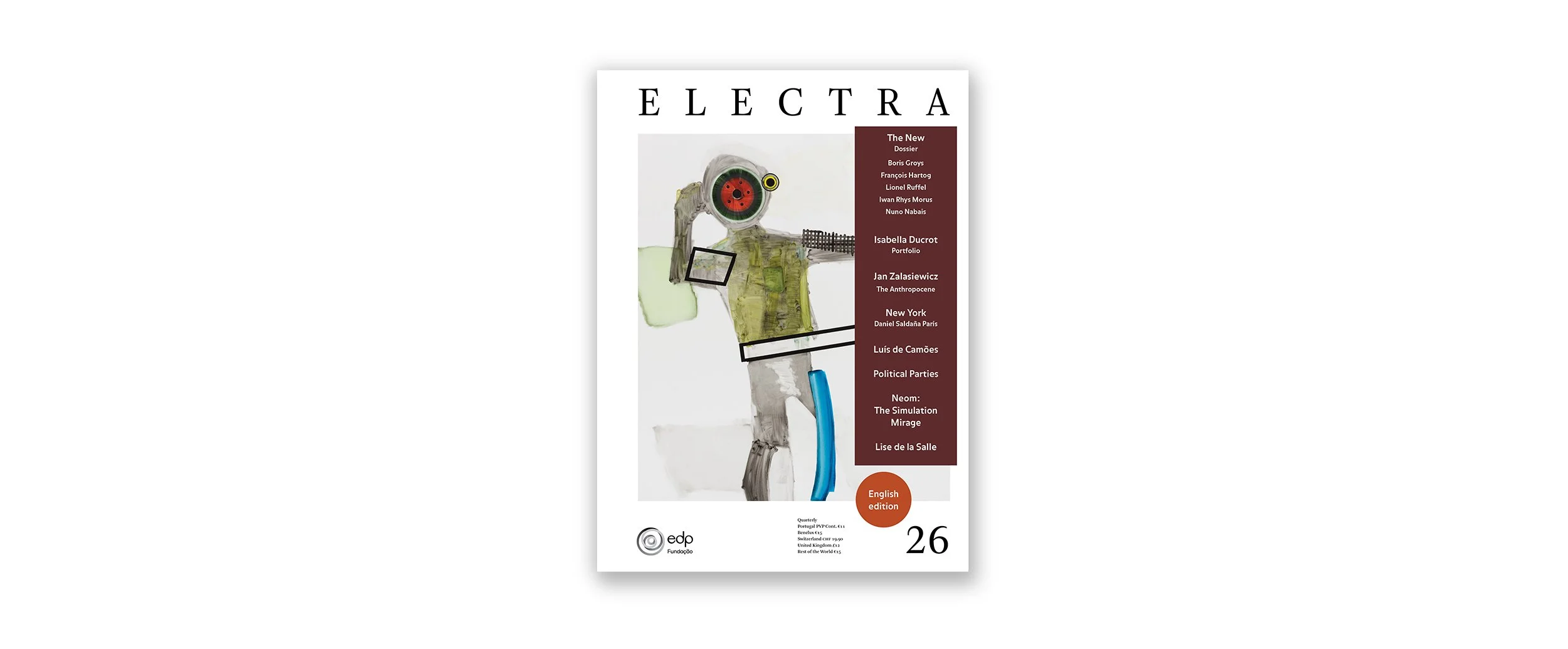....Electra 8 / Memory and Forgetting..Electra 8 / Memória e Esquecimento....












....Electra 8 / Memory and Forgetting..Electra 8 / Memória e Esquecimento....
....
“Today, memory and forgetting have gained the sounds and silences that make up the voice of our time,” one can read in the editorial of Electra’s eighth issue, announcing the theme of this edition’s dossier: Memory and Forgetting.
In this section, there is an interview with historian François Hartog, who undertakes an important reflection on key aspects of historiography and about the different ways to experience time which define each era; Bernd Stiegler, a media theorist and historian, approaches photography as a cultural asset and emphasizes the importance of preserving our photography legacy; historian Enzo Traverso describes a transition that defined the end of the 20th century: the replacement of utopias with the cult of memory; Maria Filomena Molder reflects on the question of the power of memory and mnemotechnic tools. These written pieces are illustrated with images by Gerhard Richter, a reference name in contemporary art, and the cover image is also his work.
This edition presents a portfolio by Lebanese-American artist Walid Raad, whose work is charged with anthropological, philosophical, social, aesthetic and psychological meanings, and in which war is very much present, both in cause and effect; this issue also publishes a diary by the reputed Brazilian writer, essayist and professor, Silviano Santiago, in which moments from his everyday life are interspersed with the tense political and cultural life in Brazil; and Moroccan writer Abdellah Taïa is interviewed by António Guerreiro.
“Scoop” is a new section in Electra whose purpose is to reveal authors’ unpublished, original work. In this edition, Indian photographer, painter and director Sarah Singh presents, in both words and images, her next film.
Also, the founder and editor of Art Press magazine Catherine Millet provocatively comments on a quote by Louis Aragon; the city of Havana is revisited by Cuban writer and journalist Carlos Manuel Álvarez and by the frames of Agnès Varda; and Cristina Fernandes presents her take on Pedro Costa’s latest film, Vitalina Varela.
.
Softcover, 27 x 20 cm, 228 pages
—
..
“Hoje, a memória e o esquecimento ganharam os sons e os silêncios que fazem a voz do nosso tempo.” diz o editorial do número oito da Electra anunciando o tema do dossier desta edição: Memória e Esquecimento.
Nesta secção, é entrevistado o historiador François Hartog, que desenvolve uma importante reflexão sobre questões fundamentais da historiografia e sobre as modalidades da experiência do tempo que definem cada época; Bernd Stiegler, teórico e historiador dos media, aborda a fotografia como um bem cultural e sublinha a importância da preservação do património fotográfico; o historiador Enzo Traverso descreve uma transição que marca o final do século XX: a substituição das utopias pelo culto da memória; Maria Filomena Molder pensa a questão da força da memória e dos instrumentos mnemotécnicos. Estes textos são ilustrados por imagens de Gerhard Richter, uma referência da arte contemporânea, sendo também sua a imagem da capa.
Nesta edição é apresentado um portfolio do artista libanês-americano Walid Raad, autor de uma obra densa de significados antropológicos, filosóficos, sociais, estéticos e psicológicos, na qual a guerra está muito presente, com as suas causas e consequências; é publicado um diário do prestigiado escritor, ensaísta e professor brasileiro Silviano Santiago, onde são registados momentos do seu quotidiano cruzados com a tensa vida política e cultural do Brasil; e o escritor marroquino Abdellah Taïa é entrevistado por António Guerreiro.
“Furo” é uma nova secção da Electra destinada a revelar criações originais inéditas de autores. Nesta edição, a fotógrafa, pintora e realizadora indiana Sarah Singh apresenta, com palavra e imagens, o seu próximo filme.
E ainda, a fundadora e editora da revista Art Press, Catherine Millet comenta provocatoriamente uma citação de Louis Aragon; a cidade de Havana é revisitada pelo escritor e jornalista cubano Carlos Manuel Álvarez e pelos fotogramas de Agnès Varda; e Cristina Fernandes faz uma leitura do último filme de Pedro Costa, Vitalina Varela.
.
Capa mole, 27 x 20 cm, 228 páginas
—
....
“....From the moment when the future is illuminated, we also know that we should hold on to the past, what is important and what is not. History as a discipline in this new regime in the 19th century knew very well what it was necessary to learn from the past, because history is teleological […]..A partir do momento em que é o futuro que ilumina, sabe-se também o que convém reter do passado, o que é e não é importante. A História, a disciplina histórica que se inscreve neste novo regime, no século XXI, sabe muito bem o que é necessário apreender do passado porque a História é teleológica […]....”
“....I don’t believe in the randomness of fate. A tied know is meant to have a purpose. A generally ambiguous one. A purpose kept under lock and key. And in thus being, one must rush backwards. The machinations of fate aren’t last minute. Written down in life’s diary, they await H-Hour. ..Não acredito na espontaneidade do acaso. Nó dado visa a um fim. Em geral, ambíguo. Guarda-o a sete chaves. Se o guarda, há que se correr para trás. As maquinações do acaso não são de última hora. Anotadas na agenda da vida, ficam à espera da hora H. ....”
“....[…] all my life I have had the fantasy of a fluid, fragile desire pervading the urban atmosphere, with a softening effect on the behaviour of people who are usually hurried, harried and repressed. Caressing a hand that holds open a door for you, feeling another hand sliding up your legs as you expose them to the person behind you on the escalator. A pressure or a knowing smile that holds you to nothing when you have to slip out of the metro’s mass of humanity in the rush hour. All this, just in passing, without any fuss. ..Toda a minha vida […] tive a fantasia de que um desejo flutuante, lábil, preenchesse a atmosfera urbana e suavizasse os hábitos dos citadinos apressados, agredidos e prisioneiros. Uma mão que nos segura a porta e que acariciamos, uma outra que sobe ao longo das nossas pernas quando as expomos à pessoa atrás de nós na escada rolante, um descomprometido roçar ou sorriso cúmplice quando se tem de deslizar para fora da massa humana de uma carruagem de metropolitano em hora de ponta. Tudo desta forma, apenas de passagem, sem outras consequências. ....”
-
....
Director / José Manuel dos Santos
Editor / António Guerreiro
Portfolio / Walid Raad
Published by Fundação EDP
Winter 2020Softcover, 27 x 20 cm, 228 pages
ISBN 978 972 8909 956.. Director / José Manuel dos Santos
Editor / António Guerreiro
Portfólio / Walid Raad
Publicado por Fundação EDP
Inverno 2020Capa mole, 27 x 20 cm, 228 páginas
ISBN 978 972 8909 956....












One of the most consistent and yet fully surprising architects working today, Álvaro Siza, Pritzker Prize shares his List spanning from fundamental editions on Alvar Aalto or Walther Gropius, to lesser-known Italian modernism, Brazil, critical history and philosophy, a striking novel, and poetry, from Portuguese to Greek and Persian masters.